Humanities & Social Sciences
Gerda Henkel Evaluators commend CHUSS PhD Cohort System for Reviving Humanities at Mak
Published
3 years agoon
By
Jane Anyango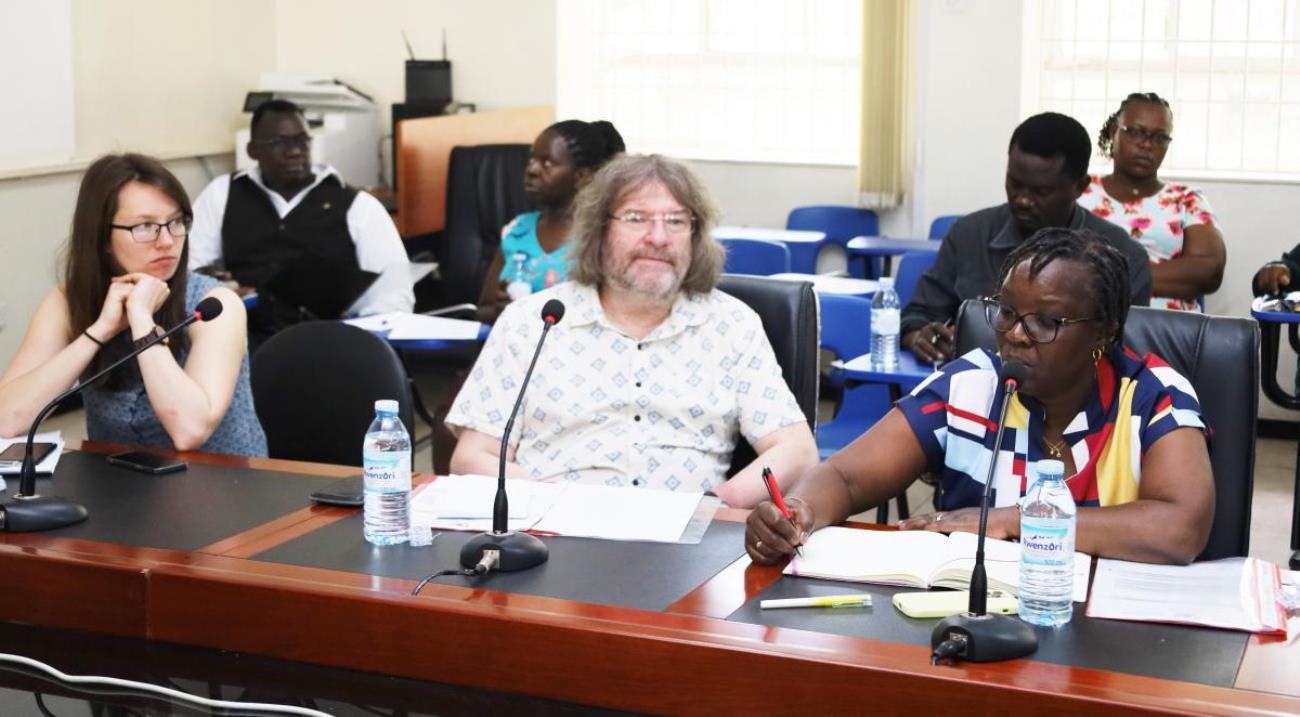
A team of Evaluators from the Gerda Henkel Foundation has commended the College of Humanities and Social Sciences (CHUSS) for implementing the Lisa Maskel Fellowships saying, it has revived the Humanities at Makerere University.
The Evaluators led by the program Coordinator Gerda Henkel Foundation Dr Joyce Nyairu, had a three days engagement (26th-29th May 2023) with university top management, the Directorate of Graduate Research and Training, the CHUSS project steering committee, current fellows and alumni as well as the heads and Graduate studies coordinators in CHUSS
The reason for these engagements was that this programme has been in existence for ten years starting at the university Stellenbosch, then Makerere University and the University of Ghana which has been the last to join.
The lead evaluator Dr. Joyce Nyairo said, Gerda Henkel evaluates their projects after 10 years and the issue has been to go round to each one of the universities and Makerere has been the last one after Ghana and Stellenbosch.
Dr. Nyairo accompanied by Prof Andreas Eckert and Ms. Jane Frey was meeting the CHUSS Heads of Departments and graduate Studies Coordinators on 29th May 2023.
“We are here now to find out how Makerere is doing on this program not because the funding must be brought to an end but because all funding projects have the capacity for improvement”.
“What we were interested in were the lessons that have been learnt, where are the challenges, where have you made some innovations, how you are trying to overcome those challenges you are struggling with, what lessons can also be shared with other universities and where you need stronger collaboration”, Dr. Nyairo explained.
The interactions focused on aspects like supervisors and student’s needs, the need for expertise and sufficient capacity for multidisciplinary research, students’ foundational knowledge that can enable them undertake quality PhD, how the university is dealing with plagiarism, students health and ability to complete within the prescribed study period and solutions.
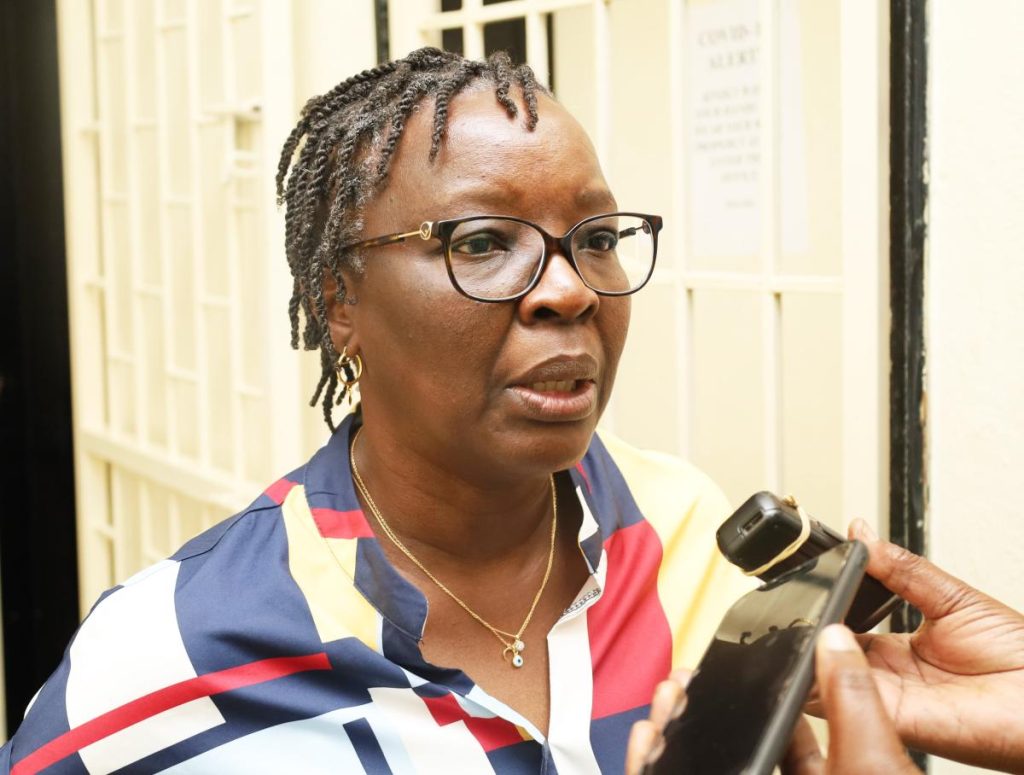
Dr. Nyairo described the conversation with the faculty, coordinators and supervisors as fairly candid. Besides giving extensive gratitude for the scholarship, Dr. Nyairo said they expected the students to be more expressive.
“I have had fantastic conversation with the faculty talking about the intellectual scoop, how it has impacted by a program like this what are the implications for expansion, what is sacrifices and what can be gained. So, it has been a good three days of engagement. From here we make our report as evaluators to Gerda Henkel and then they decide what changes to make”.
We want to see students who have the capacity for criticism and critical judgement.
Money is one problem. It does not solve everything. so, where are the more problems. I would have loved to hear something more critical from students”, She added
Dr. Nyairo commended CHUSS for implementing the project.
“It is gratifying to see how the humanities have been revived at Makerere. It is great that the university is bench-marking other programmes based on what CHUSS is doing in this programme”.
I want to see Makerere University take on the burden of this PhD programme and begin to support some of the things and not rely on donor funds that’s how we will know that the program has been entrenched and has great impact”, The main evaluator said.
CHUSS Projects Coordinator Dr. Edgar Nabutanyi said, by the time the project closes, it would have trained 58 PhDs in historical Humanities and Humanistic Social Sciences
Dr. Nabutanyi said the CHUSS-Gerda Henkel Foundation PhD Training partnership sought to achieve three goals namely: – to assist the college reclaim the tattered image of the Humanities in the public and private tertiary institutions in the region. Second, to train the next generation of Humanities scholars to replenish the disciplines lest they die out and third, to equip the next generation of Humanities scholars with intellectual and investigative skills that can be deployed in studying the human condition in their respective societies in order to delineate the elusive concept of what it takes to ensure a good life.
“The above broad aims of the partnership have been actualised in form of the recruitment of 6 cohorts or 60 PhD Fellows from different Historical Humanities and Humanistic Social Sciences disciplines from various universities in Uganda and Sub-Saharan Africa”, Nabutanyi explained
He said from 2017, the college received funding to train a total of 60 PhD fellows for four major cost items related to PhD training in the Historical Humanities and Humanistic Social Sciences such as tuition, stipend, medical insurance, laptop computer, books, travel to take up the fellowship, conference attendance and field work funds. The partnership also funded travel, personnel costs and research or PhD training costs such as buy-in-time, research workshops, retooling seminars and the CHUSS symposium.
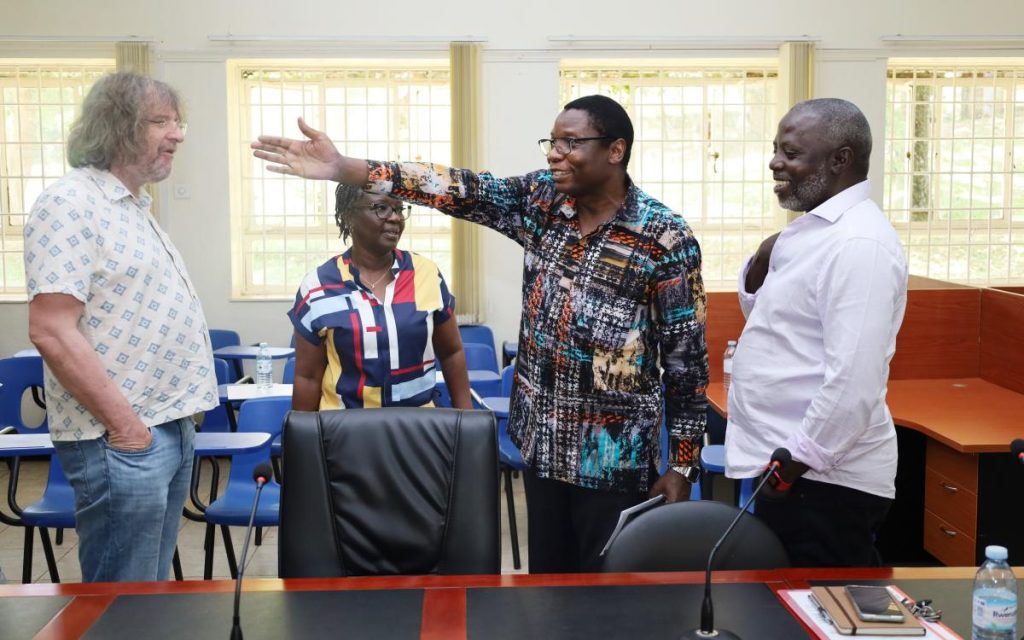
Dr. Nabutanyi also reported that 9 Fellows of the 2017 cohort did complete their studies and graduated during the 2021, 2022 and 2023 Makerere, Similarly, 6 Fellows of the 2018 cohort did complete and graduated during the 2022 and 2023 Graduation ceremonies. 2 Fellows have submitted their theses and await examination.
3 Fellows of the 2018 cohort, are expected to submit during the second half of this year and only one fellow among the 2019 cohort, has submitted his thesis for examination while the remaining 9 have not yet completed their studies 6 months after the lapse of their funding.
Nabutanyi partly attributed the poor rate of completion among the 2018 and 2019 cohort to the impact of COVID-19 of their studies adding that the 2018 cohort got supplementary covid funding hoping to organise a similar intervention for the 2019 cohort.
The funding according to Dr. Nabutanyi had an indicative budgetary component of USD 55,600 that was earmarked for material, equipment, and renovations expenses for the college.
The funding as reported by Dr. Nabutanyi has also supported and/or allowed the college to innovate regarding an intellectual/scholarly infrastructure.
CHUSS & Funders discuss possible extension of the PhD study period
Dr. Nabutanyi noted that the college and funders have noted the challenges that come with the time of three years to complete the PhD and going forward, the timeline is going to be reviewed so that the interests of the students and the funders and the college are taken care of.
Speaker after speaker commended the program for the positive attributes
“The funded students have a specific time within which to complete their programme and the work is scheduled. With these funds, students are given seminars where academic writing, research methodology and other aspects of their PhD are taught”, Dr. Charlotte Mafumbo.
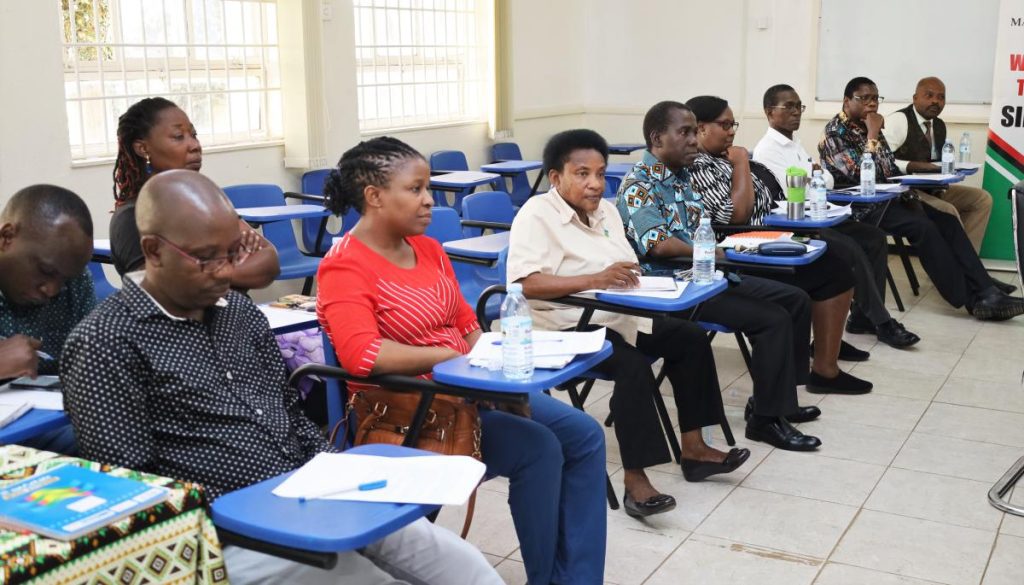
Dr Elizabeth Kyazike expressed gratitude for the Gedah Henkel funding on grounds that it has opened up opportunities for funding non- priority program like archaeology and that it has been difficult to find archaeologists with PhDs in Uganda.
“Archaeologists do a lot of experiments and to do an internationally recognised PhD within three years is not possible. In archaeology, the pressure is immense and the sacrifice is the health of students who are almost running crazy given the university requirement that they must publish in order to graduate” Dr. Elizabeth Kyazike.
“The period given is 3-5 years and indeed some people have done it in 3 years but bear in mind that it has impact on the quality of the product because we have year 1 of proposal writing, so we have 2 years so it is likely to have impact on the quality of the PhD”. Another lecturer submitted.
Dr. Lutwama – Rukundo Evelyn noted that although the project has a strong coordination unit ensuring that students meet the deadlines, submit progress reports and organise seminars, the 3-year scholarship limit also affects the mental health of supervisors.
“The 3year constraint also impacts on the mental health of supervisors who have to balance supervision of the PhDs, teaching masters and undergraduate students, conducting research, publications, community services and attracting funding, and meeting social life needs and obligation inclusive”, Dr. Lutwama – Rukundo Evelyn.
To Dr. Zaid Sekito, it is possible to complete a PhD in 3 years because many have made it but the only challenge is that students abscond and forget they are full time and fully funded. “We need to change the mindset of students to know that they are full tine irrespective of whether they are nationals or foreign” Dr, Sekito said.
Dr. Orikiriza Celestino noted that although the program has brought on board PhD students for faculty for mentorship and an almanac that is followed including seminars, conferences, workshops where students are encouraged to present that have led to improvements, the sacrifice that comes with the 3-year limit is the scope of the study.
“From my students experience, we are supposed to do three dimensions of the scope of the study but we ended up doing only one because the student had to finish within the funding period” Prof. Wamala said.
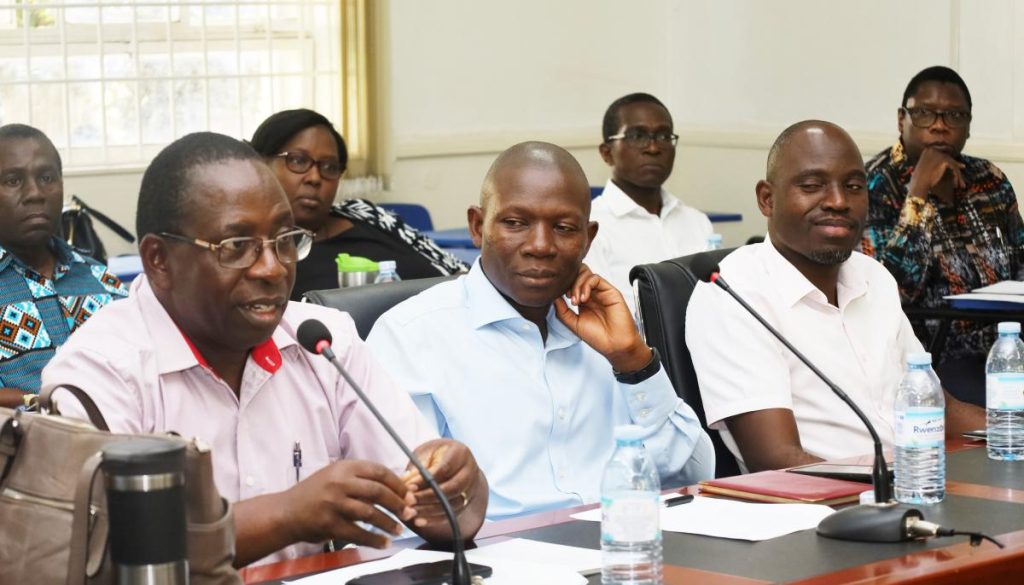
Prof. Peter Atekyereza commended Gerda Henkel for providing funds for the most neglected areas but noted that there is a challenge of completing in 3years when one is a fully funded student at home with many competing needs resulting into mental illness but noone declares.
Citing his student conducting a study on engendering military on peace missions from different states, Atekyereza said it was challenging to get interviews from states to produce data worth a PhD within the three-year study time.
“There are social and emotional risks that is why students suffer in silence and are not willing to declare that they are mentally ill because it has implications for work, the family and public image” Dr. Atekyereza added
Dr. Roscoe submitted that very few people finish PhD in three years and those that succeed go through mental stress and are unhappy
.“The sacrifice is the mental health of the student. I want a scholar to discover and explore who they are. Sometimes they should be granted breaks. I always don’t see people who are happy because there is too much pressure. Context is key but what about the well-being of the student and the stress experienced by the supervisor. We want to restore the dignity of the scholar and let us make academic writing fun”
You may like
-


Advert: Admissions for Diploma/Degree Holders under Private Sponsorship 2026/27
-


Makerere’s 76th Graduation Ceremony: CHS showcases research strength with 26 PhD Graduates
-


Mak 76th Graduation Ceremony: CoNAS Presents 16 PhDs & Best Performing Male Student in the Sciences
-
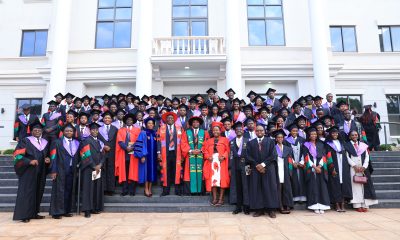

Mak 76th Graduation kicks off: SoL hailed as a Centre of academic Excellence
-


CAES Presents Overall Best Performing Student in the Sciences & a Record 28 PhDs at the 76th Graduation Ceremony
-


Over 9,200 to graduate at Makerere University’s 76th Graduation
Humanities & Social Sciences
Meet Najjuka Whitney, The Girl Who Missed Law and Found Her Voice
Published
1 week agoon
February 23, 2026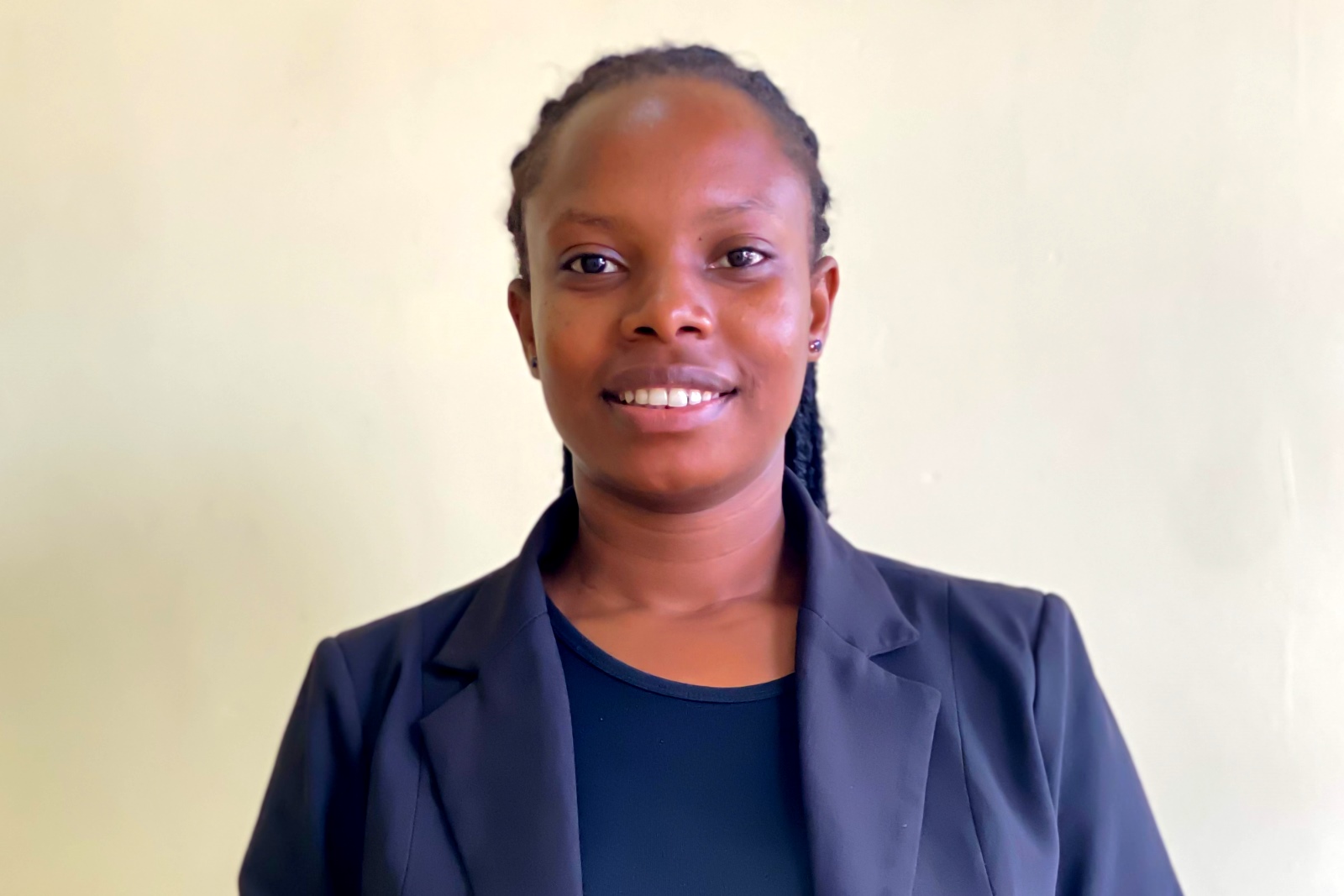
On the morning of Friday, February 27, when the academic procession winds its way across Makerere University’s Freedom Square for the last day of the 76th Graduation Ceremony, Whitney Najjuka will walk into history with a number beside her name: 4.46.
At Makerere, that number means First Class Honours. It means the Vice Chancellor’s List. It means she graduates as the only First-Class student in Journalism and Communication this year. But numbers, as Whitney has learned, rarely tell the full story.
Born on March 27, 2002, in Nabbingo, Kyengera Town Council, to Margaret Kusemererwa and Fred Kasirye, dreamt she would do Law, one of the disciplines, prestigious, almost inevitable next steps for a student who had excelled in secondary school. She had done everything correctly. Studied hard. Scored well. Followed the script.
But Makerere University had other plans. She missed the pre-entry mark, but found her name under Journalism and Communication, another prestigious course offered by the Journalism and Communication Department at Makerere University.
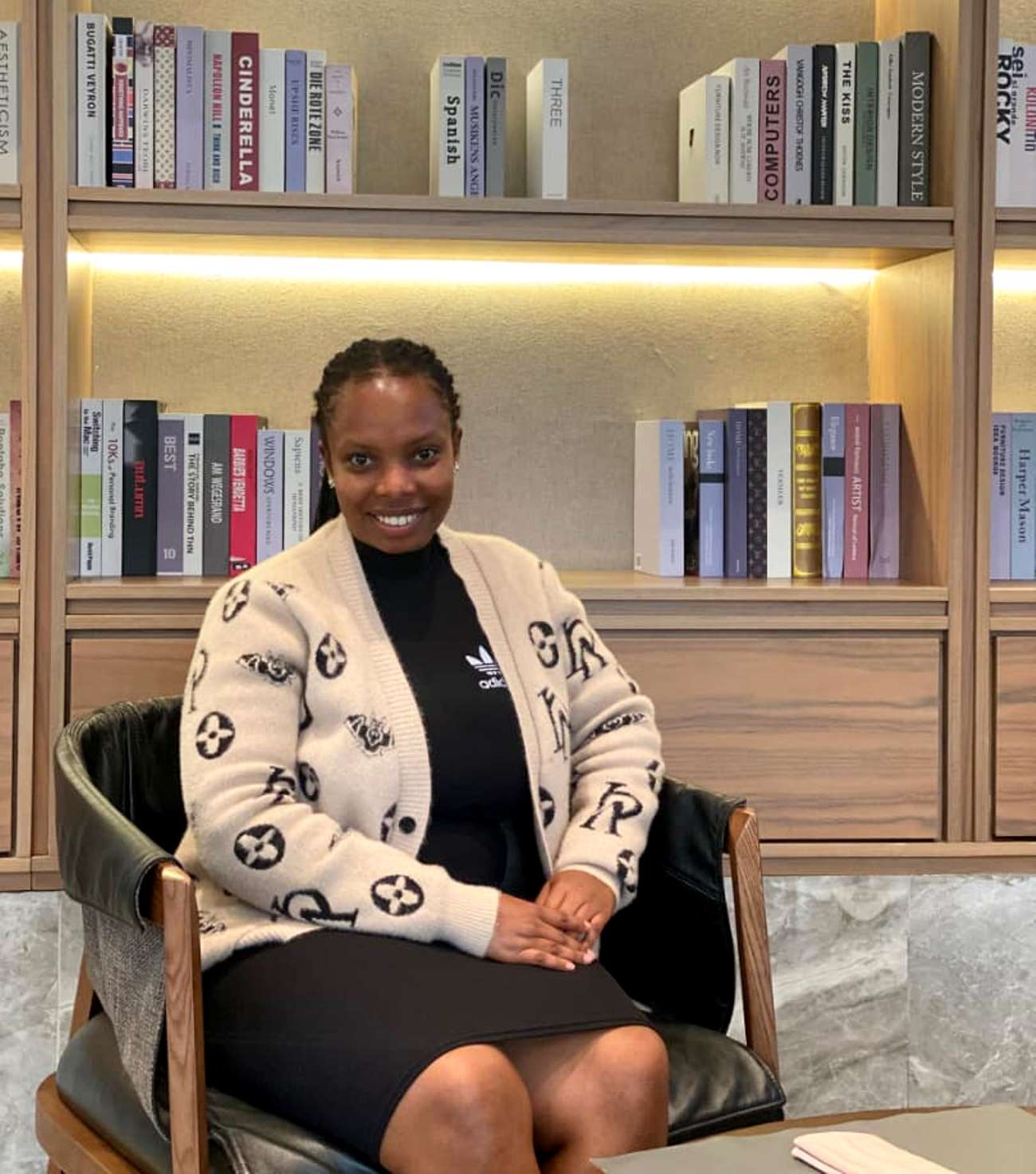
Najjuka began her academic journey at Muto Primary School in Buwama, earning 8 aggregates in the Primary Leaving Examination, a performance that positioned her strongly for secondary school.
She would later join St. Lucia Hill School, Namagoma, where she earned 20 aggregates at O-Level and 17 points in History, Luganda, and Divinity at A-Level.
Missing her dream course, Law, felt at first, like a detour. But Whitney was encouraged by Sanyu Christopher, her uncle, and she settled for a government-sponsored slot in the Bachelor of Journalism and Communication at Makerere, which she had applied for before.
She entered uncertain. But she graduates transformed.
The Pivot That Became a Purpose
Whitney speaks of her early university days with candor. She did not arrive at the Department of Journalism and Communication with a burning childhood ambition to be a journalist, but because another door had closed.
Then, Social and Behavior Change Communication happened. Applied Strategic Communication happened. She began to see media not as headlines and microphones, but as architecture, shaping how societies think, argue, and act.
The turning point came in her third year. The Female Journalist Foundation published her story on Sexual Gender-Based Violence (SGBV) and its emotional toll on survivors. What startled her was not its publication but the reaction. Comments flooded in. Debates ignited, especially about the role of men in combating GBV.
“I realized media doesn’t just report,” she says. “It frames how society views a crisis.”
Her voice, once tentative, had entered a national conversation.
The Discipline Behind 4.46
At Makerere University, a First Class CGPA is not built on brilliance alone but on ritual.
Whitney’s ritual began with showing up, on time, every time. She treated lectures as appointments with her future self. She refused to confine her learning to the syllabus. While attending workshops at the Aga Khan Graduate School of Media and Communication and obtaining external certifications, she sought and was open to mentorship through the Public Relations Association of Uganda (PRAU).
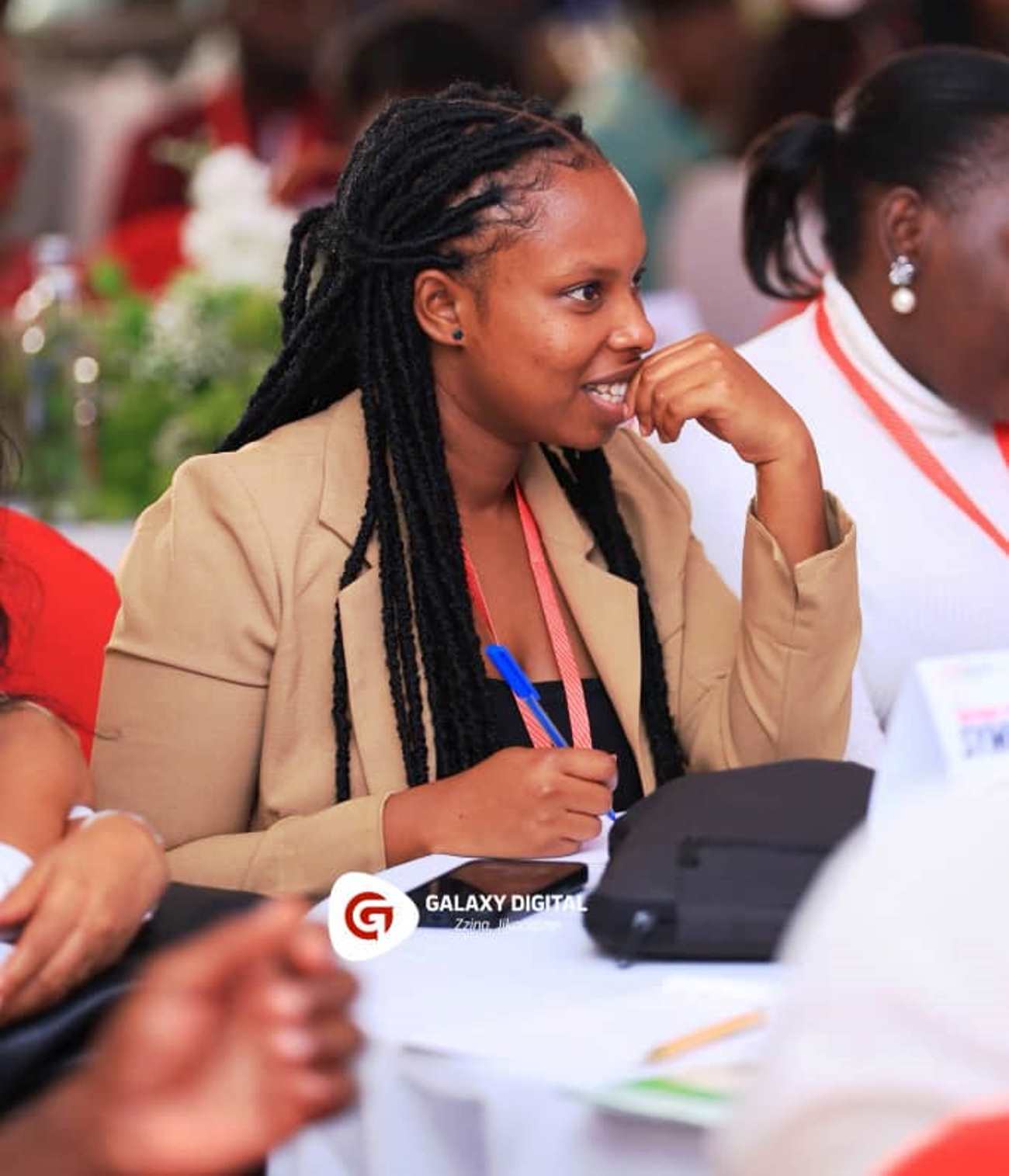
She wanted theory anchored in practice. And then there was the commute.
From Nabbingo, a hill in Wakiso District, some 18.6 km to Kampala, where the Makerere Main campus is situated, and back, nearly 20 hours a week dissolved into Kampala traffic. Two-hour journeys before 8:00 a.m. lectures. Dust. Noise. Headaches. She learned to manage energy the way others manage time. Fatigue became a tutor in resilience.
“I had to be intentional with every remaining hour,” she says. “Excuses were not an option.”
Learning to Practice Communication
If classrooms taught her analysis, presentations taught her courage. Pitching projects, defending research, and standing before peers quick to critique forced her to think on her feet. She was no longer simply studying communication; she was practicing it.
In 2024, the AGMES Fellowship at the Aga Khan Graduate School of Media and Communication pushed her further. She received funding to produce a capstone project on the mental impact of gender-based violence on survivors. She identified sources, conducted interviews, handled trauma with care, and worked with professional editors.
The Communication, she learned, is logistics and ethics as much as eloquence.
The Future She Sees
Whitney is optimistic about Uganda’s media landscape. The digital shift, she believes, has democratized influence. Young communicators are no longer confined to legacy newsrooms or offices.
Yet she sees a gap in the absence of structured research on sustainable, ethical, profitable independent media ventures in Uganda. Her ambition is not only to practice communication, but to study it. To produce data-backed frameworks that help young Ugandans transition from graduates to media entrepreneurs.
She wants to make the impact scalable.
What Remains
As the only First-Class graduate in her cohort, she is careful not to mythologize herself. “Success isn’t brilliance alone,” she says. “It’s a daily commitment when nobody is watching.”
Even before graduation, Whitney had stepped into the industry through a mentorship internship at Capital One Group (COG EA Ltd), a strategic marketing communications agency operating across East Africa.
At Capital One Group, we spoke to Paul Mwirigi Muriungi, the Managing Director and Head of Strategy, who spoke of Najjuka as a progressive and intentional young professional who approaches her work with curiosity, maturity, and responsibility.
“Her attitude is exemplary. She is teachable, receptive to feedback, and eager to grow. While technical skills can be taught, character, work ethic, and mindset determine long-term success, qualities that Whitney consistently demonstrates. Given her academic excellence and professional application, we believe she has a bright future both at Capital One Group and within the wider communications industry. She represents the kind of talent the profession needs: thoughtful, adaptable, and committed to excellence.
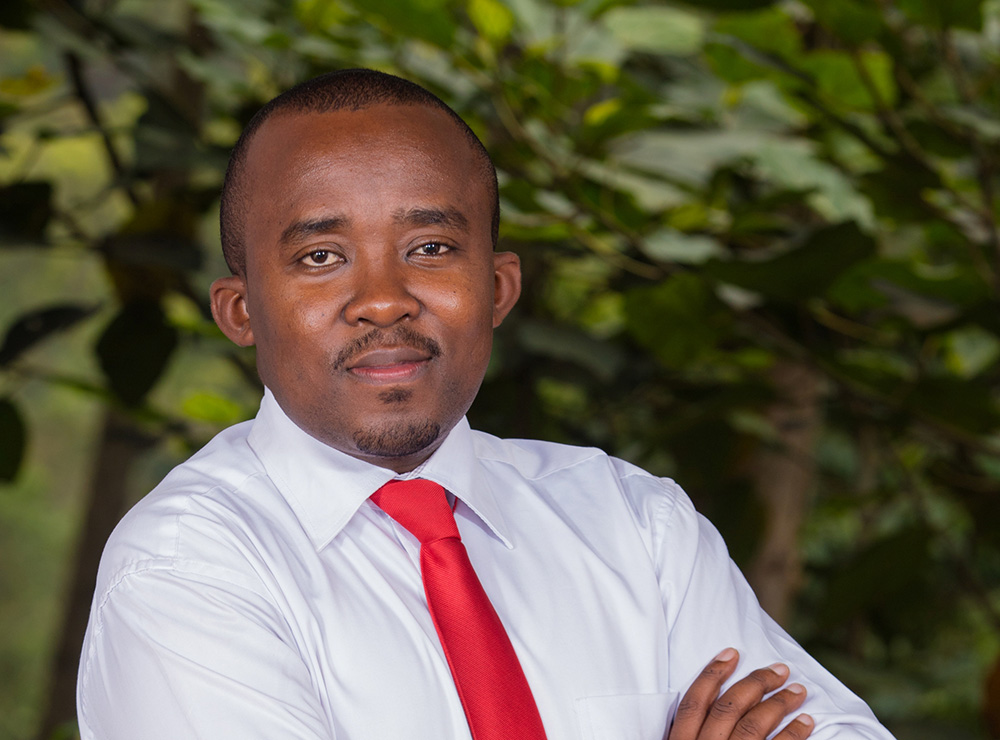
“We look forward to seeing her next chapter unfold,” says Mwirigi.
Najjuka’s gaze extends beyond her own trajectory. She speaks of what the Department could become. Furnished and equipped with industry-standard equipment, newsroom simulations, and deeper investment in data journalism as prayers. Her excellence is not self-congratulatory, but it is forward-looking.
“The University should support the Department to procure industry-standard equipment. Access to high-quality cameras, sound booths, and updated editing software like Adobe Creative Suite is critical to our learning environment,” she says.
Adding that, “We need a newsroom simulation, a physical or digital space where students work under real-time deadlines to produce content for the public. That would prepare us for industry and even strengthen the University’s own media platforms.”
In an era defined by metrics, algorithms, and digital traceability, data journalism is no longer a niche skill but a sine qua non of credible reporting. “There should also be more focus on data journalism and search engine optimization. These are no longer optional skills. Students would benefit immensely from stronger training in these areas.”
Dr. Aisha Nakiwala, the Head, Department of Journalism and Communication, says the faculty are very proud that she is graduating with a First Class—the only one in this year’s cohort.
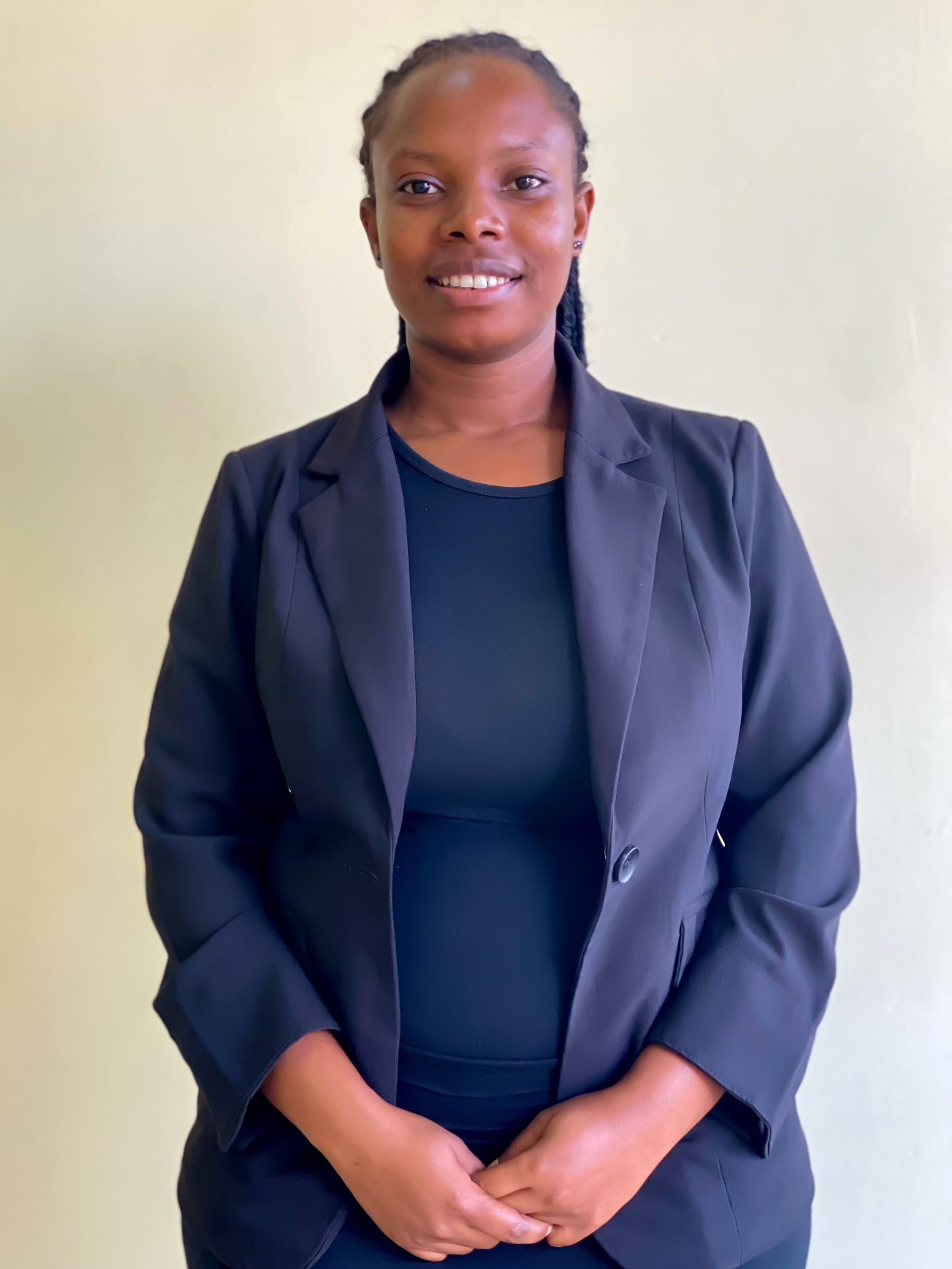
“This achievement reflects not only exceptional intellectual ability but also discipline, resilience, and sustained dedication to the highest standards over four years. Graduating with first-class honors is no small feat; it requires consistent outstanding performance.
“Her accomplishment sets a powerful example for continuing students and reaffirms our department’s commitment to nurturing excellence. We are confident she will make meaningful contributions to the communication profession and society at large,” says Dr. Nakiwala.
On graduation day, applause will crest and recede. The gowns will fold back into wardrobes. The transcripts will be filed away in cabinets. But something quieter will endure; a young woman from Nabbingo who once missed her Law mark, who spent 20 hours a week on the road, who discovered that storytelling is power, and who now walks into Freedom Square not by accident, but by intention.
Life, as she has come to understand it, lives on.
Humanities & Social Sciences
Dr. Pamela Khanakwa Honored for Steering Record 18 PhD Candidates for the Mak 2026 Graduation
Published
1 month agoon
January 23, 2026By
Jane Anyango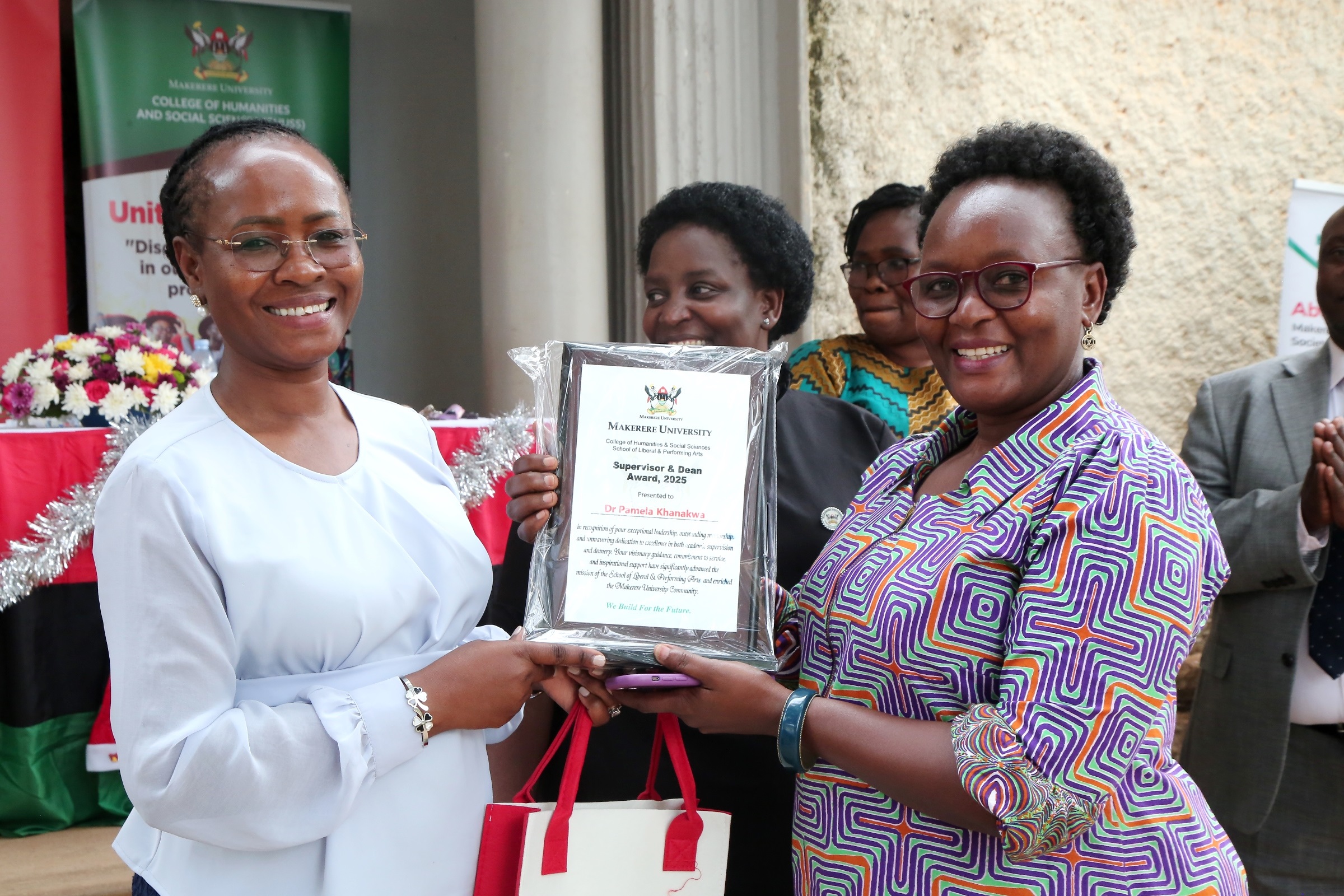
Six personally supervised, three completed in record time, as School of Liberal and Performing Arts sets a historic milestone. Dr. Pamela Khanakwa got the Award as Best PhD Supervisor and Dean
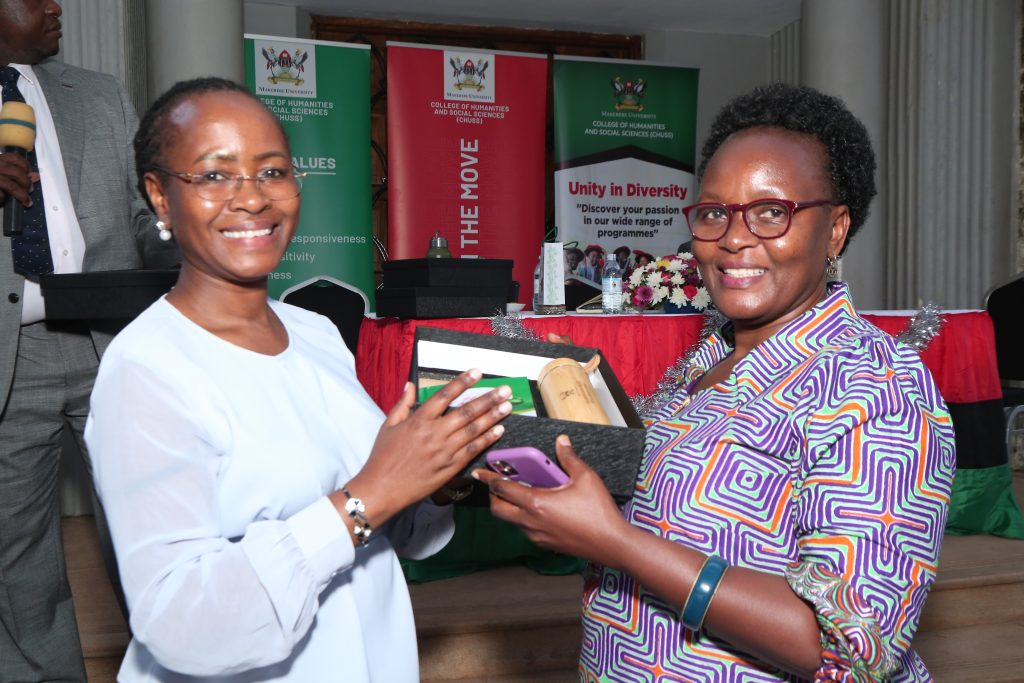
A Historic Academic Milestone for SLPA
The College of Humanities and Social Sciences (CHUSS) recognised the Dean of the School of Liberal and Performing Arts (SLPA), Dr. Pamela Khanakwa, for outstanding academic leadership that has seen the School field 18 PhD candidates for the next 2026 Makerere University Graduation Ceremony scheduled for 24th-27th February. Remarkably, six of these doctoral graduates were directly supervised by Dr. Khanakwa, with three completing within the official three-year timeframe, an exceptional achievement in graduate training. The recognition was announced during the CHUSS End-of-Year Get-Together, where staff applauded Dr. Khanakwa’s dedication, humility, and relentless commitment to postgraduate supervision and timely completion.
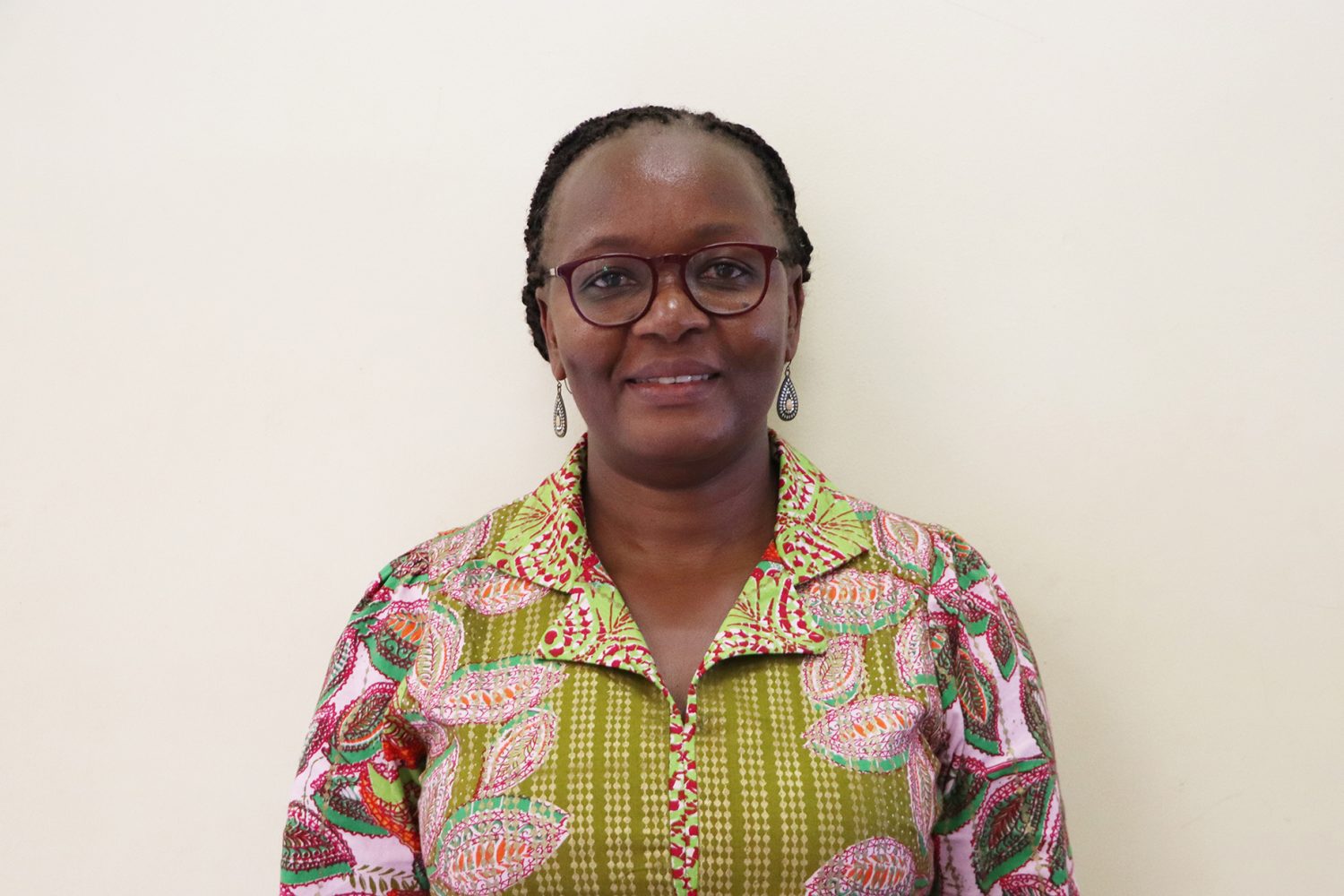
Message to Academic Staff
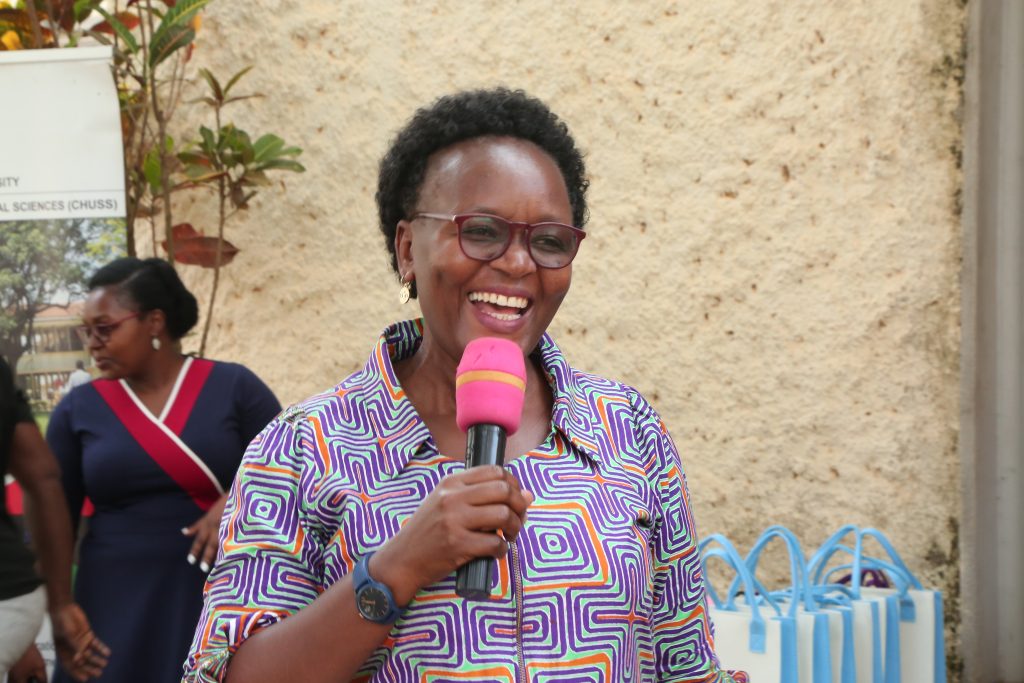
Q: What message do you have for your staff following this achievement?
Dr. Khanakwa:
First, I celebrate my staff and thank them for their dedication to supervision and student support. Academic work is demanding, and material rewards are often limited, but the true satisfaction comes from seeing students succeed.
I encourage my colleagues to remain committed. Yes, the workload is heavy, but many things are possible with dedication and teamwork. Let us continue working for the good of our students, our School, and Makerere University.
Leadership Rooted in Humility
Q: Many colleagues describe you as humble, down to earth, and hardworking. What shapes this character?
Dr. Khanakwa:
I think it is largely my upbringing. My mother was a primary school teacher from the 1950s until the mid-1980s. She worked extremely hard to raise us, combining teaching with farming to ensure we had school fees and basic needs. From her, I learned humility, discipline, and the value of hard work.
I also learned that leadership positions are temporary. You occupy them today, and tomorrow you move on. So humility is essential.
My graduate training also shaped me significantly. My PhD supervisor emphasized that graduate study is a full-time job and that results matter more than noise. Let people see your work through outcomes, not announcements.
Supervision as a Two-Way Commitment
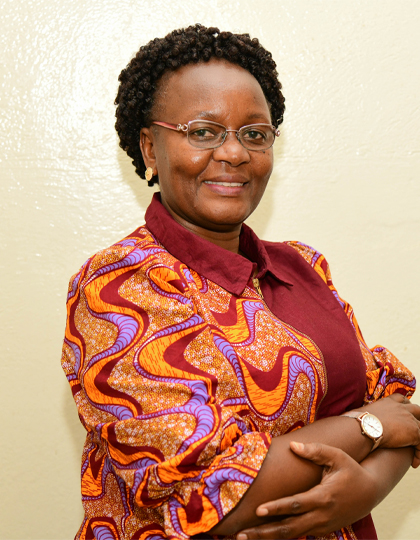
Q: How would you describe your supervision style?
Dr. Khanakwa:
I read my students’ work thoroughly, word by word. Sometimes my comments are tough, but they are honest. Supervision is a two-way commitment. I give feedback, but students must also respond and remain engaged. When that relationship works, progress happens.
Balancing Leadership, Scholarship, and Family
Q: How do you balance being a Dean, scholar, wife, mother, and daughter?
Dr. Khanakwa:
Honestly, I am not sure I balance perfectly. My mother lives far away in Bukwo, so visiting requires careful planning. My children grew up understanding the demands of academic life. I pursued my PhD in the United States and spent long periods away, but we adapted as a family.
Work has become part of my lifestyle. I use weekends to read dissertations, review manuscripts, and write. Sometimes my children ask if I ever sit without working, but this is the commitment I made. As we often say jokingly, “We humbly applied for the job, so let us do the job.”
Scholarship Beyond Supervision
Dr. Khanakwa is also an active scholar and editor. In the past year alone, she has:
- Edited scholarly volumes on archives, memory, method, and pedagogy
- Published a book with Routledge Companion
- Co-authored journal articles and book chapters with graduating students, including Priscah Asiimwe and Anatoli Lwasa Mpijja
“I feel an obligation to write with students,” she notes. “It takes time, energy, and commitment, but it is part of academic mentorship.”
Who Is Dr. Pamela Khanakwa?
Dr. Pamela Khanakwa is the Dean, School of Liberal and Performing Arts, College of Humanities and Social Sciences, Makerere University. She is a seasoned scholar, supervisor, administrator, and mentor whose leadership continues to redefine graduate training excellence. Details about Dr. Pamela Khanakwa can be accessed at: https://chuss.mak.ac.ug/en/personnel/pamela-khanakwa/
More details are available in her attached curriculum vitae.
The CHUSS End- Of-Year-Get-Together
On 12th December, 2025 the college leadership organised a get-together end of year gathering to take stock of the achievements, challenges and brainstorm together on how to move forward. The event was marked by entertainment, team building games, appreciation speeches, sharing a meal and a Christmas package for every staff
Retirees and staff recognised
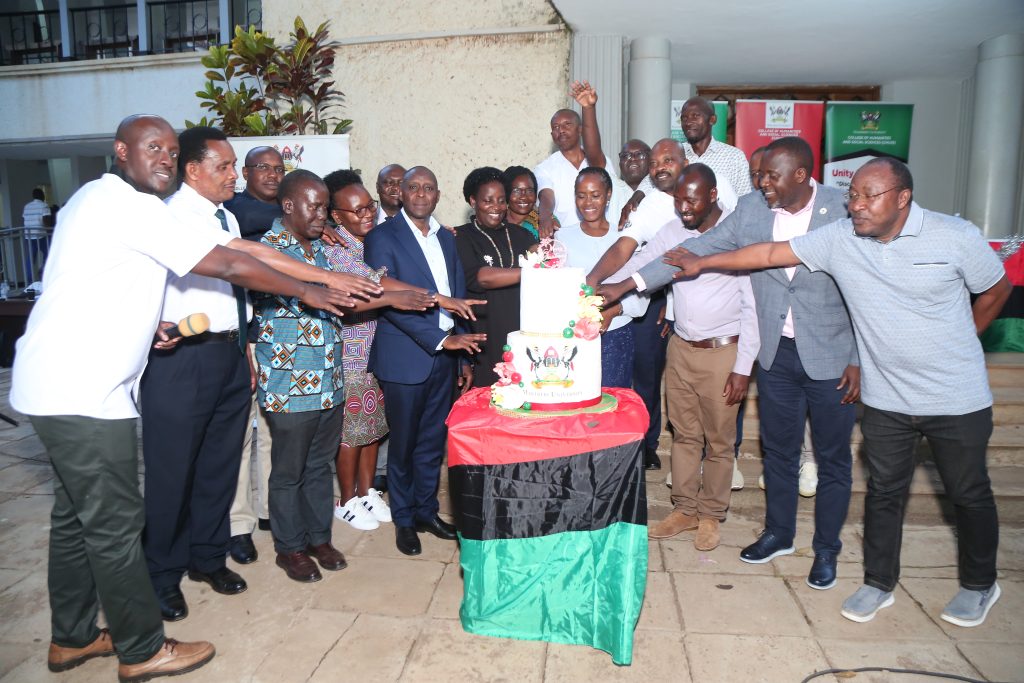
Five retired staff Dr. Micheal Wangotta Masakala, Dr. Anatole Kirigwajjo and Dr. Jackson Kizza Mukas (all from the School of Languages, Literature and Communication), Assoc. Prof. Florence Nansubuga (School of Psychology), Dr. Tusabe Gervase (School of Liberal and Perforing Arts) and Ms. Scovia Nganda Sekweyama (secretary from the School of Social Sciences) were recognised for their dedicated services to the university.
In addition to Dr. Pamela Khanakwa’s Award as Best PhD Supervisor and Dean, Ms. Birabwa Florence scooped the award of Best Registrar of the year. Birabwa is the registrar for the School of Liberal and Performing Arts.
Administrative and support staff including Ms. Mary Gyezaho and Annet Kashumbusha(both administrative secretaries in the Principals office), Farouq Lule (IT Officer), Godfrey Kakooza (cleaner), Charles Sebuguzi (driver) and Jane Anyango (Communications officer) were recognise with awards for outstanding service. Dr. Mohamed Mayanja Kajumba was from the School of Pyschology was recognised as the person with an outstanding talent in Handwriting.
The celebrations held in the Arts quadrangle were graced by the Vice Chancellor Academic Affairs Prof. Sarah Ssali and the Deputy Vice Chancellor in charge of Finance and Adminstration Prof. Ireeta Tumps.
Humanities & Social Sciences
Ugandan Journalists Trained on Peace and Gender-Sensitive Reporting Ahead of 2026 Elections
Published
2 months agoon
January 9, 2026By
Jane Anyango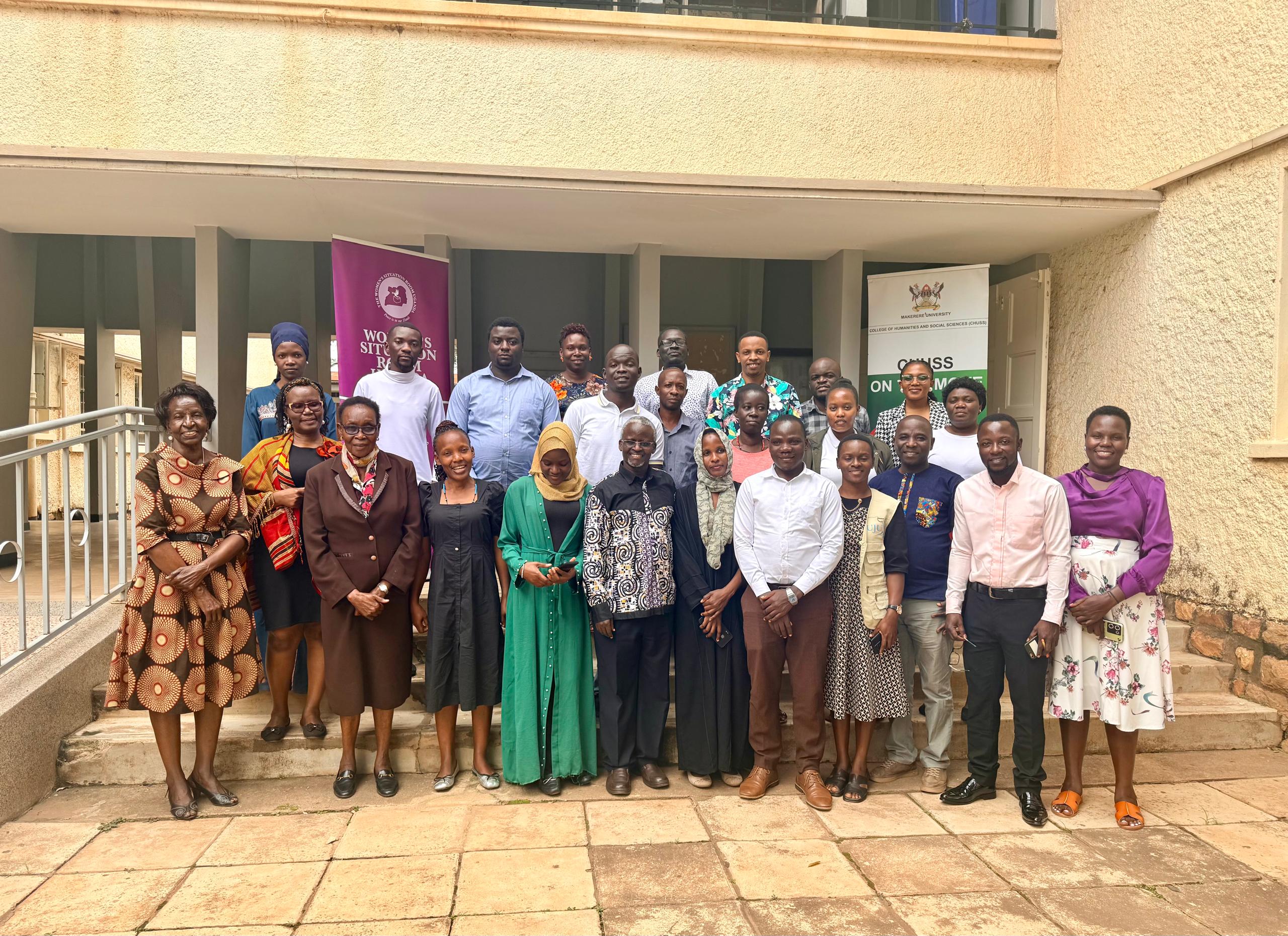
Kampala, Uganda – January 9, 2026
Ahead of the January 15 general elections, Ugandan journalists have undergone specialized training on peace and gender-sensitive reporting to ensure responsible media coverage during the election period. The two-day training, held from 8th to 9th January 2026 at Makerere University’s College of Humanities and Social Sciences Smart Room, was organized by the Women’s Situation Room (WSR) in partnership with various stakeholders and brought together journalists from across print, broadcast, and online platforms.
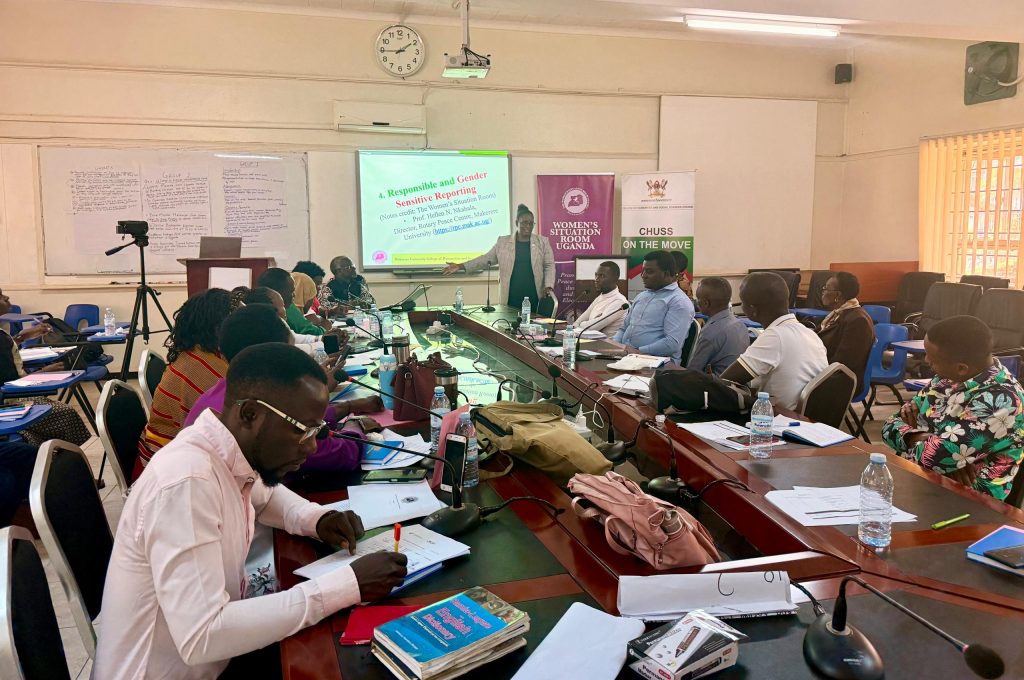
The main objective of the training was to strengthen the capacities of media in reporting and documenting electoral processes in a responsible and gender-sensitive manner. The specific objectives included: strengthening journalists’ skills to cover the 2026 elections in a fair, balanced, gender-sensitive, and non-violent partisan way; enhancing the role of media to enable citizens to be well-informed and actively participate in the election process; ensuring focused and balanced reporting on peace during and after elections; and strengthening partnerships between the WSR and media houses during the election period.
The training covered multiple critical modules. Day one focused on responsible conflict-sensitive reporting, emphasizing principles such as balance, impartiality, and accuracy. Participants explored the role of media as a relayer of the population’s voice, election monitor, catalyst for social cohesion and reconciliation, contributor to the accountability of political actors, and a platform for detecting and debunking digital media misinformation and hate speech.
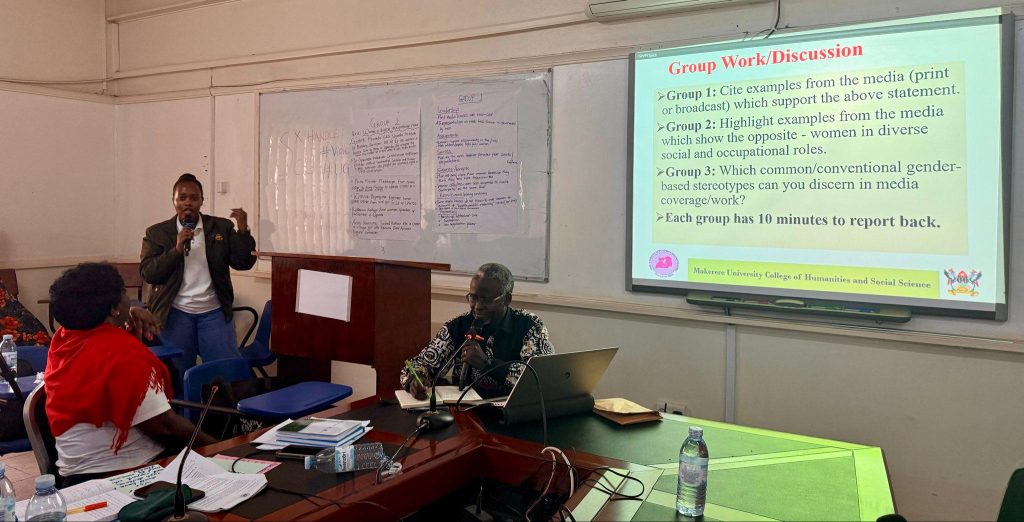
Day two addressed responsible and gender-sensitive reporting. Key aspects included the definition of gender-sensitive reporting, how to become a gender-sensitive reporter, critical elements in reporting with gender awareness, packaging gender-sensitive stories, and a checklist for detecting and avoiding gender-insensitive reporting.
Her Lordship, retired Judge Justice Mary Mayitum, emphasized the importance of peace as the foundation of development and democratic engagement. “Because we value peace more than anything. Without peace, really, you can do nothing. But where there is peace, you can have time to reflect, discuss with others, and join in meaningful dialogue,” she said. She warned that the country’s past conflicts, such as those in Gulu, underscored the necessity of maintaining national harmony.
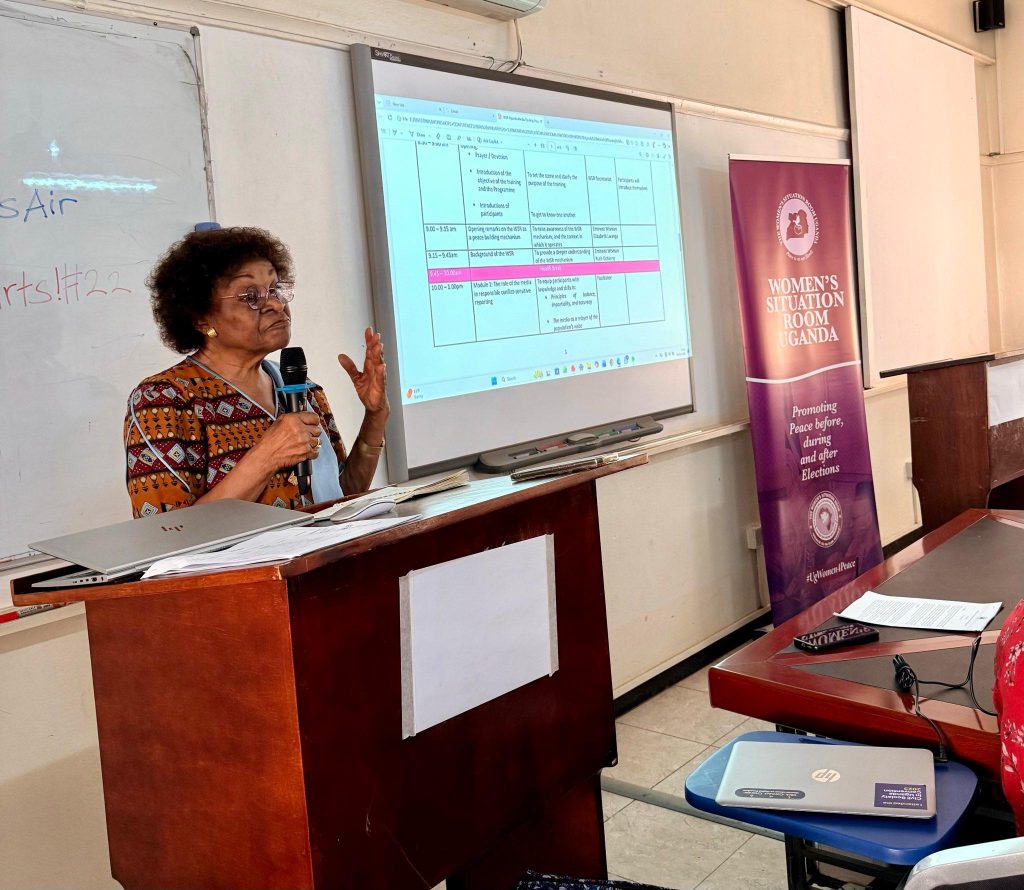
Justice Mayitum also urged other key election stakeholders to uphold peaceful conduct. “Being peaceful is the very heart of life. We have spoken to police, security personnel, political parties, and the Electoral Commission. We want politicians to have a code of conduct and to understand that it’s okay to think differently without fighting or hating one another,” she added.
Dr. William Tayebwa, lead facilitator and senior lecturer in the Department of Journalism and Communication at Makerere University, said, “This training is about conflict-sensitive reporting, peace journalism, and gender-sensitive reporting in the context of the elections. The emphasis was on giving female political candidates a voice while ensuring journalists report responsibly on election-related matters.”
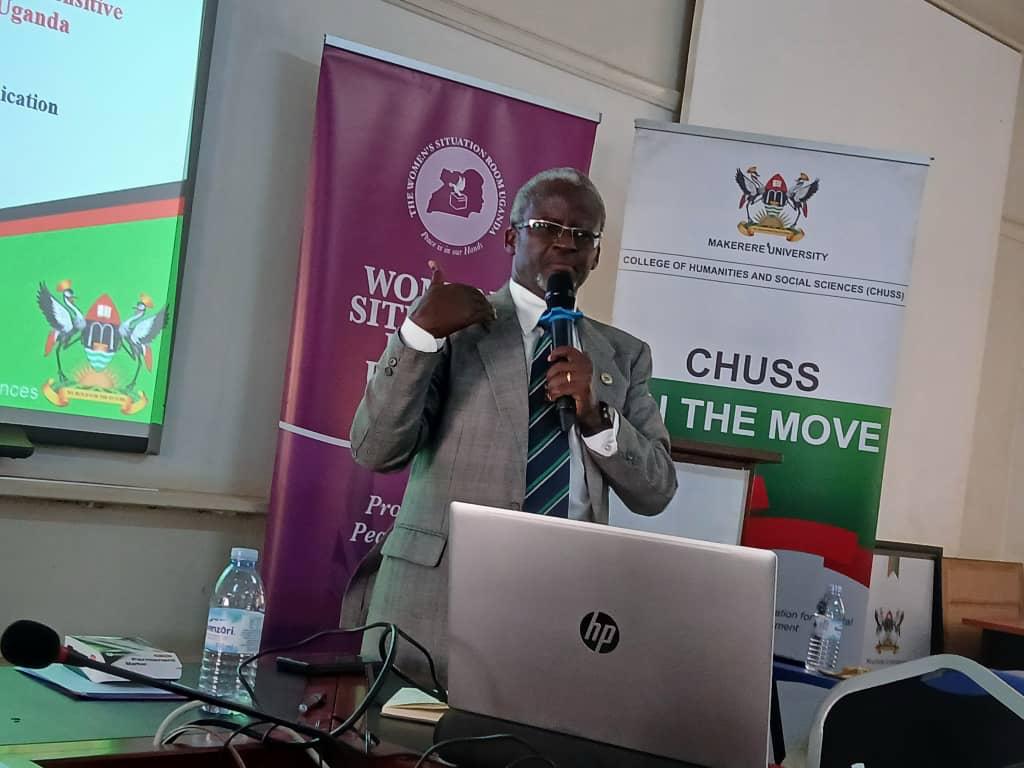
Participants described the training as timely and impactful. Tony Banizengabo of CBS Wakiso District said, “We’ve benefited a lot. We’ve been trained to write stories which bring peace, not conflict. Ahead of the elections, we are very ready to be part of peacemakers.”
Dorcas Kimono of UBC TV Kampala added, “It was so timely and rich. We learned how to report without promoting or fueling violence, giving voice to victims without angering them or encouraging violators. This is very vital, especially as we approach the 2026 elections.”
The training aims to equip media personnel with the knowledge and skills to uphold professional ethics while contributing to a peaceful, inclusive, and gender-sensitive electoral process.
Trending
-

 General4 hours ago
General4 hours agoCall for Applications: Diploma Holders under Government Sponsorship 2026/2027
-

 Humanities & Social Sciences1 week ago
Humanities & Social Sciences1 week agoMeet Najjuka Whitney, The Girl Who Missed Law and Found Her Voice
-

 General4 hours ago
General4 hours agoAdvert: Admissions for Diploma/Degree Holders under Private Sponsorship 2026/27
-

 General1 week ago
General1 week ago76th Graduation Highlights
-

 Agriculture & Environment2 weeks ago
Agriculture & Environment2 weeks agoUganda Martyrs Namugongo Students Turn Organic Waste into Soap in an Innovative School Project on Sustainable Waste Management
